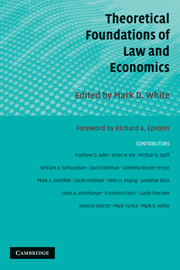Book contents
- Frontmatter
- Contents
- Foreword
- Preface
- Notes on Contributors
- PART ONE THE ROLE AND USE OF ECONOMICS IN LEGAL STUDIES
- 1 Modeling Courts
- 2 Is There a Method to the Madness? Why Creative and Counterintuitive Proposals Are Counterproductive
- 3 Functional Law and Economics
- 4 Legal Fictionalism and the Economics of Normativity
- PART TWO EFFICIENCY
- PART THREE RATIONALITY AND THE LAW
- PART FOUR VALUES AND ETHICS IN CIVIL AND CRIMINAL LAW
- Index
- References
2 - Is There a Method to the Madness? Why Creative and Counterintuitive Proposals Are Counterproductive
Published online by Cambridge University Press: 06 July 2009
- Frontmatter
- Contents
- Foreword
- Preface
- Notes on Contributors
- PART ONE THE ROLE AND USE OF ECONOMICS IN LEGAL STUDIES
- 1 Modeling Courts
- 2 Is There a Method to the Madness? Why Creative and Counterintuitive Proposals Are Counterproductive
- 3 Functional Law and Economics
- 4 Legal Fictionalism and the Economics of Normativity
- PART TWO EFFICIENCY
- PART THREE RATIONALITY AND THE LAW
- PART FOUR VALUES AND ETHICS IN CIVIL AND CRIMINAL LAW
- Index
- References
Summary
Baby-selling. Racial discrimination. Insider trading. These are just a few of the legions of contrarian proposals advanced by legal economists as efficient. Such proposals are at least counterintuitive, and perhaps even shocking. In fact, from a careerist perspective, their startling quality may be their primary virtue. But in pursuing the attention that comes with novelty, the authors of these works have overlooked the negative externalities that also accompany avant-garde positions. Legal rules that strike most people as unjust may upset community expectations and undermine the efficiency of the very rules proposed. In short, such rules may not prove wealth-maximizing at all.
Counterintuitive rules are even less likely to prove welfare-maximizing. The proclaimed goal of economics is to find welfare-maximizing policies. Because of the difficulties associated with measuring welfare, many economists – and the vast majority of legal economists – focus instead on wealth maximization. The generally implicit (but flawed) assumption is that social welfare rises monotonically with social wealth. In fact, people often express a willingness to trade some material wealth in exchange for intangible values such as justice, fairness, or even predictability. Rules that seem unjust, then, are even less likely to maximize social welfare than they are to enhance social wealth.
In this chapter, we argue that legal economists’ failure to include people's preferences for fairness undermines their policy prescriptions. Section I discusses three prominent counterintuitive proposals from legal economists.
- Type
- Chapter
- Information
- Theoretical Foundations of Law and Economics , pp. 21 - 40Publisher: Cambridge University PressPrint publication year: 2008



